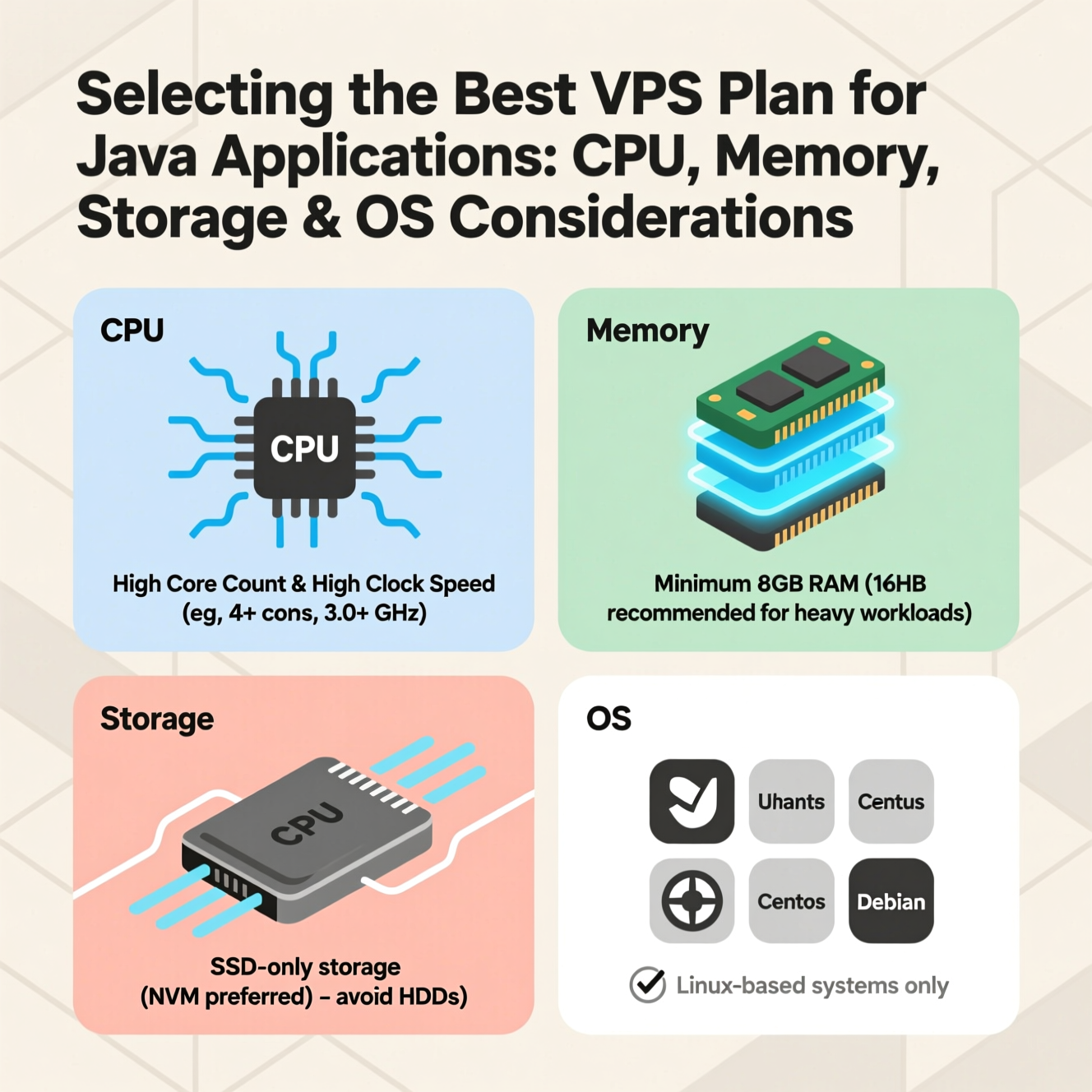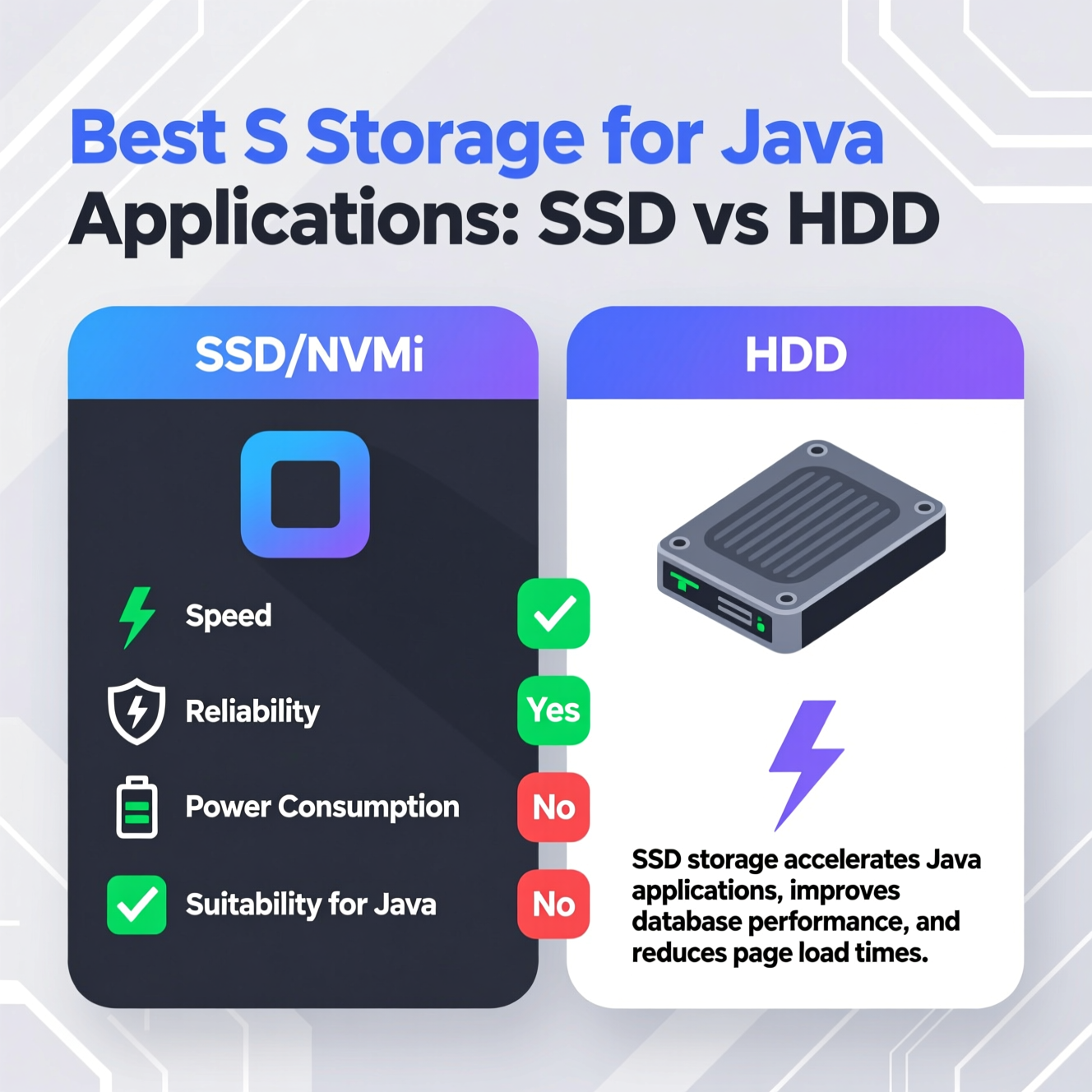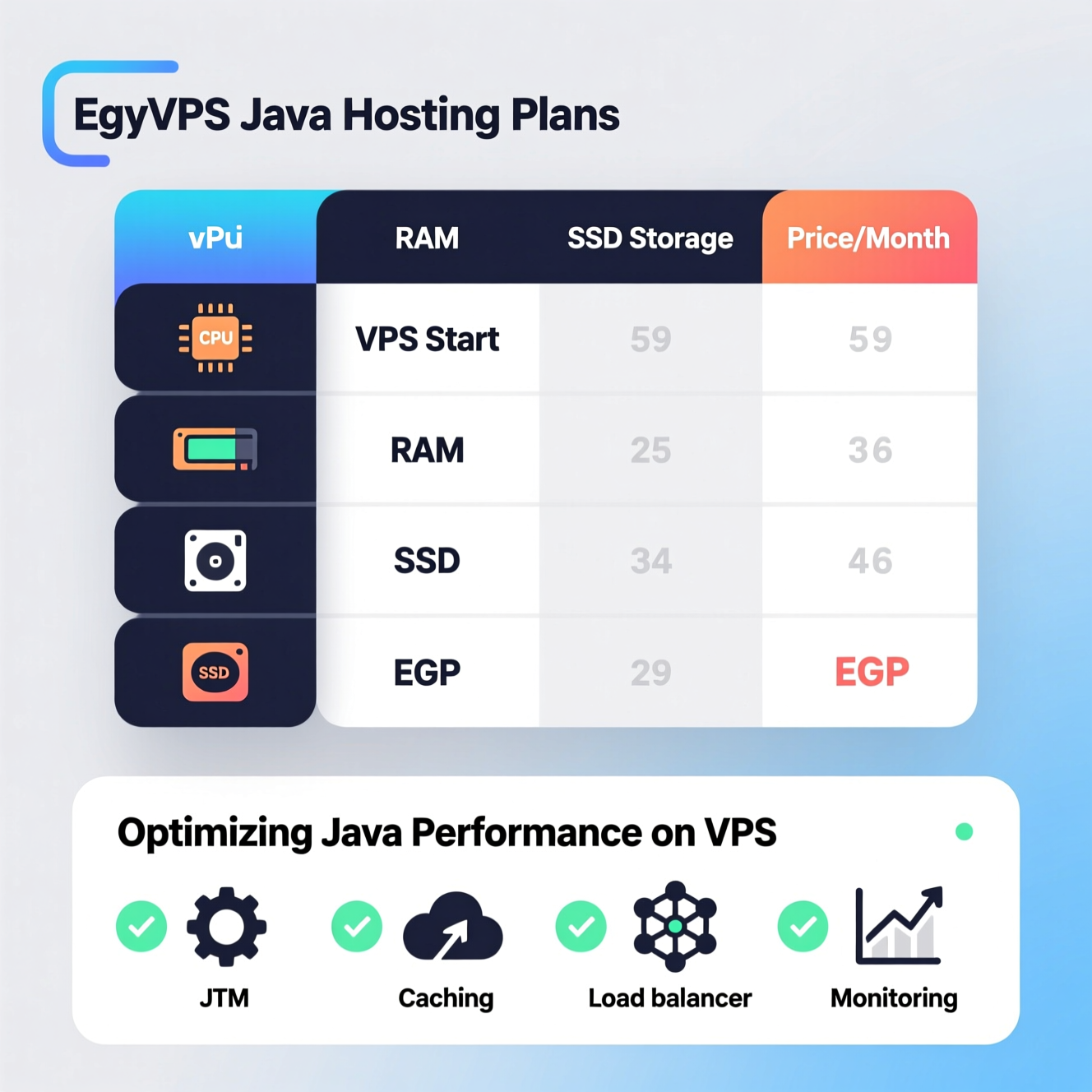Java applications are widely used in web development and enterprise systems due to their robustness and stability. Running these applications efficiently requires a powerful hosting environment that provides stable performance and adequate resources, such as CPU, RAM, storage (SSD), and an operating system (Linux or Windows).
Choosing the right VPS plan for Java applications is not arbitrary; it depends on the type of application, the number of users, and performance and security requirements. In this detailed guide, we explain how to select the best VPS plan for Java applications, compare different operating systems, and showcase EgyVPS plans as a strong example in the Egyptian and Arab market.

Java VPS Hosting refers to a Virtual Private Server specifically configured to run Java applications, such as:
Web applications (JSP, Servlets)
APIs
Spring Boot and GlassFish applications
Enterprise applications
A VPS provides an isolated environment offering:
Dedicated resources (CPU, RAM, storage)
Full control over server configuration
Stable performance even under high load
Easy scalability as the project grows
Java applications require strong resources for smooth performance, especially when handling concurrent processes or multiple users.
Recommended CPU & RAM based on project size:
| Application Type | Recommended CPU | Recommended RAM |
|---|---|---|
| Small / Test App | 2 vCPU | 4 GB |
| Medium App | 4 vCPU | 8 GB |
| Large / High Load App | 8 vCPU or more | 16 GB or more |
???? Tip: Monitor your application regularly using tools like VisualVM or Grafana to determine the right time for an upgrade.
Storage type is crucial for application speed and performance.
It’s always recommended to choose SSD or NVMe SSD for faster and more reliable performance compared to traditional HDDs.
| Feature | SSD / NVMe | HDD |
|---|---|---|
| Speed | Very High | Relatively Slow |
| Reliability | Excellent | Limited |
| Power Consumption | Low | High |
| Suitable for Java | ✅ Yes | ❌ No |
⚡ SSD storage accelerates Java applications, improves database performance, and reduces page load times.

When setting up a Java hosting environment, the main question is: Linux VPS or Windows VPS?
Excellent performance and lower cost
Compatible with most Java applications
More secure and stable
Ideal for developers preferring SSH access
User-friendly graphical interface
Suitable for .NET-based applications
Good support for commercial software
Higher cost and less flexibility compared to Linux
???? Recommendation: Choose Linux VPS for Java applications unless there’s a specific need for Windows.
Server security is critical for Java applications. Key practices include:
Enable a firewall to protect ports
Use SSH keys instead of passwords
Disable root login
Regularly update the OS and software
Encrypt communication with SSL/TLS
Monitor logs for suspicious activity
EgyVPS offers flexible and high-speed VPS plans suitable for Java applications:
| Plan | vCPU | RAM | SSD Storage | Price/Month |
|---|---|---|---|---|
| VPS Start | 1 | 1 GB | 25 GB | 75 EGP |
| VPS Mini | 2 | 2 GB | 50 GB | 110 EGP |
| VPS Pro | 3 | 4 GB | 100 GB | 165 EGP |
| VPS Elite | 4 | 8 GB | 200 GB | 235 EGP |
To ensure optimal performance:
Tune the JVM (Java Virtual Machine) for better memory usage
Enable caching for faster responses
Use a load balancer for large applications
Monitor resources regularly and upgrade plans when needed

| Feature | Linux VPS | Windows VPS |
|---|---|---|
| Performance | Higher for Java apps | Good but less efficient |
| Cost | Lower (Open-source) | Higher (Microsoft licenses) |
| Security | More secure & stable | Needs extra configuration |
| Flexibility | Very high | Limited |
| Best for | Most Java developers | .NET-specific apps |
Linux VPS is ideal for most Java applications due to performance, security, and cost.
SSD/NVMe storage is essential for faster application and database loading.
Allocate CPU and RAM according to app size and user load.
Ensure server security via firewall, SSH keys, and regular updates.
Choose a VPS plan that can scale as your application grows.
Use specialized technical support like EgyVPS to avoid technical issues.
Can I run Java on any VPS?
Yes, as long as the server supports JDK and JVM, any Java application can run smoothly.
What’s the difference between managed and unmanaged VPS?
Managed VPS includes updates and security handled by the provider. Unmanaged VPS gives you full control to manage the server yourself.
Can I upgrade my VPS plan later?
Yes, CPU, RAM, and storage can be upgraded anytime.
Does EgyVPS provide Java support?
Yes, they offer specialized support for setting up and troubleshooting Java environments.
Which OS is best for Java applications?
Linux VPS is generally best for performance, security, and cost unless your application relies on Windows-specific technologies.
Summary:
Java VPS hosting ensures high performance, dedicated resources, security, and flexibility. Linux is usually the preferred OS, SSD storage improves speed, and plans like EgyVPS offer full support.
هل تحتاج إلى Windows VPS سريع وآمن وبسعر مناسب؟
شركة EgyVPS بتوفرلك سيرفرات ويندوز جاهزة للاستخدام فورًا.
? تواصل معنا عبر: 201001197157
? أو زور موقعنا: https://egyvps.com